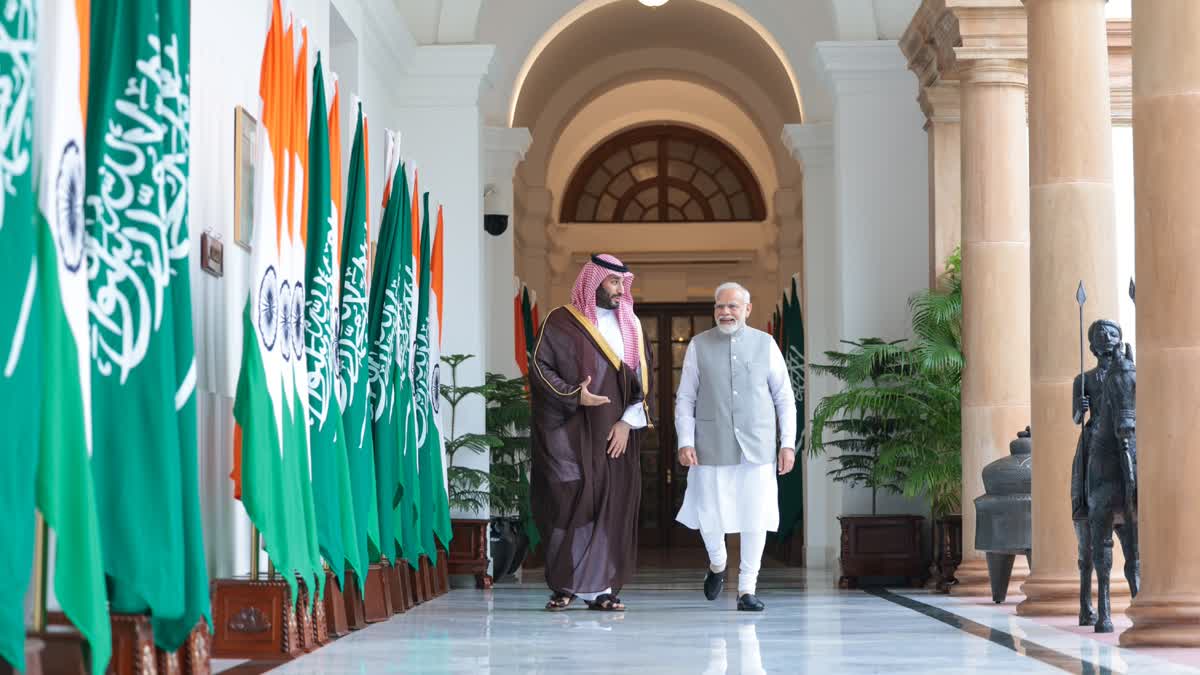New Delhi: With Prime Minister Narendra Modi telling his Israeli counterpart Benjamin Netanyahu that India condemns terrorism in all its forms and manifestations in the wake of the Hamas attack last week and Saudi Arabia calling for restraint while highlighting the deprivation of the Palestinian people of their legitimate rights, there have been speculations about whether the current conflict will have any impact on ties between New Delhi and the Arab world.
During the course of a telephone call on Tuesday, Netanyahu updated Modi about the situation in Israel following the shock attack by Hamas from Gaza on Saturday which left over 1,600 people dead on both sides.
Following the conversation, Modi posted on X: “I thank Prime Minister @netanyahu for his phone call and providing an update on the ongoing situation. People of India stand firmly with Israel in this difficult hour. India strongly and unequivocally condemns terrorism in all its forms and manifestations.”
Meanwhile, Saudi Arabia, an ally of India, while calling for an immediate halt to escalation of the conflict between the two sides, said that the situation has come about because of the deprivation of the Palestinian people of their legitimate rights.
“The Kingdom calls for an immediate halt to the escalation between the two sides, the protection of civilians, and restraint,” the Saudi foreign ministry said in a statement. “The Kingdom recalls its repeated warnings of the dangers of the explosion of the situation as a result of the continuation of the occupation, the deprivation of the Palestinian people of their legitimate rights, and the repetition of systematic provocations against its sanctities. The Kingdom renews the call of the international community to assume its responsibilities and activate a credible peace process that leads to the two-state solution to achieve security and peace in the region and protect civilians.”
-
#SaudiArabia crown prince visit: Strengthening of India-Saudi Arabia ties on agenda; what's more in spotlighthttps://t.co/M4Y8i1KqN3
— ETV Bharat (@ETVBharatEng) September 11, 2023 " class="align-text-top noRightClick twitterSection" data="
">#SaudiArabia crown prince visit: Strengthening of India-Saudi Arabia ties on agenda; what's more in spotlighthttps://t.co/M4Y8i1KqN3
— ETV Bharat (@ETVBharatEng) September 11, 2023#SaudiArabia crown prince visit: Strengthening of India-Saudi Arabia ties on agenda; what's more in spotlighthttps://t.co/M4Y8i1KqN3
— ETV Bharat (@ETVBharatEng) September 11, 2023
So, does this show that India and Saudi Arabia have divergent views on the conflict? “See, Saudi Arabia could not go against the Palestine issue,” R Dayakar, former Indian Ambassador to Iraq and Jordan who also served in the West Asia desk of the Ministry of External Affairs, told ETV Bharat.
“It is very fundamental to Saudi foreign policy.”
Dayakar pointed out that the Saudi statement does not specifically mention Hamas but only talks about the rights of the Palestinian people. Similarly, if one notes, Modi’s statement condemns terrorism in all its forms and manifestations but does not specifically name Palestinians. “Prime Minister Modi’s statement should be seen from the context of the devastation that Israel has suffered following the attack,” Dayakar said. “India’s basic policy of supporting a two-nation formula will not change.”
During a standalone visit to Ramallah in the West Bank in 2018, a first by an Indian prime minister, Modi had voiced his support for an independent Palestine nation. The previous year, Modi had made a similar standalone visit to Israel, also a first by an Indian prime minister. Dayakar explained that whatever statements are issued by New Delhi or Arab capitals, including Riyadh, on the current conflict, ties between the two sides will not be impacted.
Also read- Hamas attack on Israel: Congress refutes rift in CWC resolution supporting Palestinian cause
“India’s stated foreign policy is that its bilateral ties with one country is independent of its ties with a third country,” he stated. Meanwhile, Saudi Arabia has called for a meeting of the Organisation of Islamic Cooperation (OIC) over the current conflict. “The Saudis are standing for the Palestinians and not the Hamas. Saudi Arabia is calling the meeting to rally OIC support for Palestine, not Hamas,” Dayakar said.


